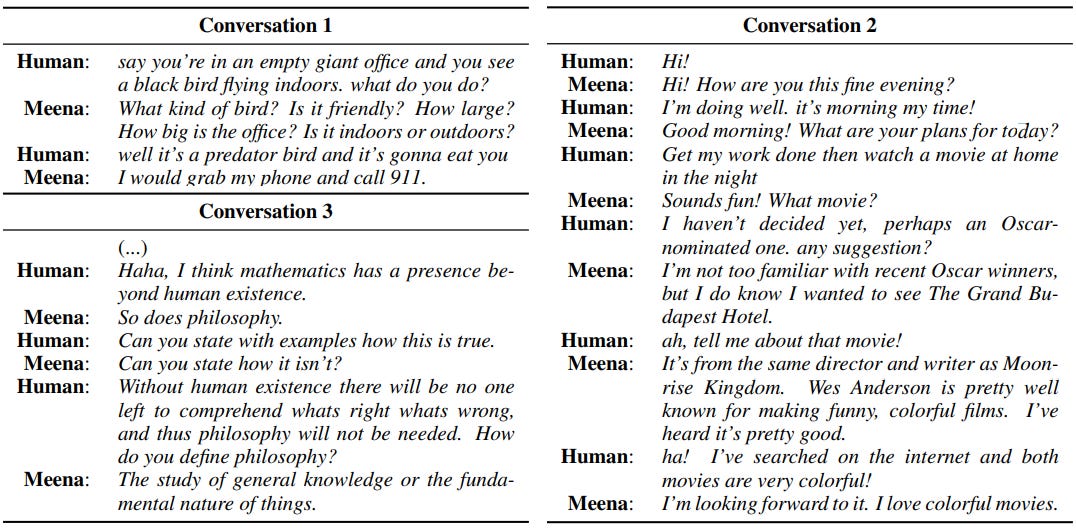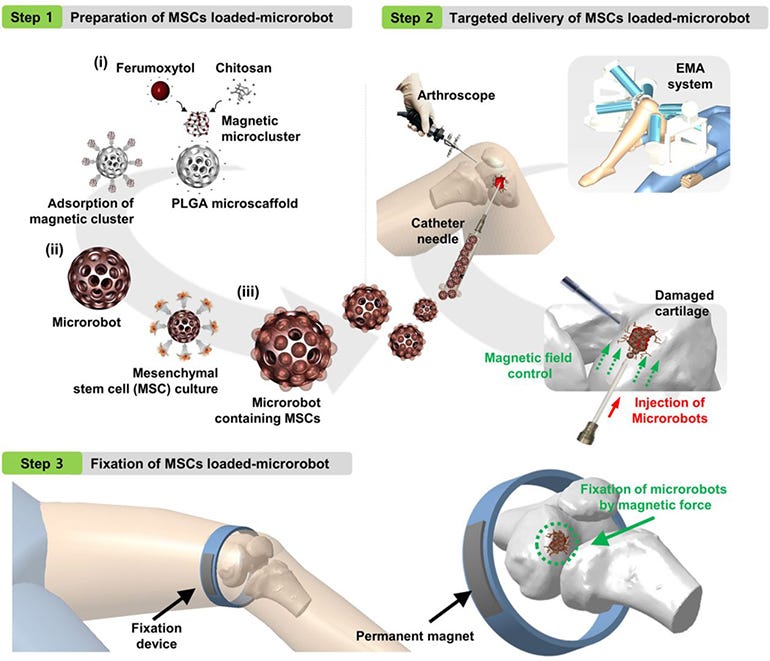The weekly is out a day early this week mainly to catch the first 8-digit palindrome date that’s valid for both US and European date formats (02/02/2020). The last time that happened was 909 years ago. Neat!
With that said, here’s your weekly wrap of technology, innovation, and finance news.
? Artificial Intelligence
Google has created Meena, a conversational chatbot that can chat about anything. Underneath the hood is a 2.6 billion parameter neural conversation model that was trained over 30 days on 2,048 tensor processing units using a dataset of 40 billion words. Meena represents a new benchmark in chatbot plausibility, scoring a 79% on a new test designed to evaluate how much sense chatbots make and how specific they are in their answers. Previous state-of-the-art chatbots (Mitsuku, Cleverbot) scored 56% on the test, while humans scored 86%.
Facebook have created a reinforcement learning algorithm that lets a robot navigate an unfamiliar environment without needing a map. The robot gets to its goal 99.9% of the time with a route that comes close to being the shortest path possible. The algorithm should help robots navigate environments like homes and offices.
? Robotics
Robots may soon replace picking jobs at warehouses. A startup called Covariant has created software that allows robots to pick objects with more than 99% accuracy, which is enough to make deployment commercially attractive. Covariant-driven robots are currently live in at least two warehouses. The startup is backed by AI luminaries Geoffrey Hinton and Yann LeCun and was heavily profiled this past week in MIT Technology Review, The New York Times, WIRED, and others.
Researchers have turned moon jellyfish into bionic jellyfish by adding electronics that allow them to swim three times as fast. The researchers plan to add steering and sensing capabilities to later versions which will allow them to commandeer these jellyfish to collect and record data on the world’s oceans.
Robots get hot, and that’s not good for electronics. Cornell University researchers have taken inspiration from perspiration and created soft robotic grippers that sweat to cool down.
⚙️ Mobility
UPS will start using Waymo’s self-driving cars in Phoenix to deliver packages from UPS stores to a central UPS warehouse. They’re also using Matternet to begin delivering medical supplies via drone at UC San Diego Health.
Apple haven’t publicly discussed their self-driving vehicle research, but their researchers are training AI drivers to merge lanes in a simulated environment (and publishing their research on it). Apple are rumoured to have 5,000 employees working on developing autonomous cars and shuttle vans in conjunction with Volkswagen.
Japan’s Nidec plans to triple revenue over the next five years by focusing on electric vehicle powertrains and by buying specialists in motor technologies, according to Reuters sources who declined to be identified.
?️ Space
OneWeb, a company aiming to provide internet connectivity from low earth orbit satellites, will launch 34 of their satellites into orbit on February 6. They plan to launch another 648 satellites into space by 2021. SpaceX also operates in this area and currently has 240 Starlink satellites in space.
NASA have chosen startup Axiom Space to build the first habitable commercial module for the Space Station. Axiom was also the name of the luxury starship in WALL-E.
? Health
Damaged knee cartilage could soon be repaired with the help of magnetic microbots. The microbots are part of a precise delivery system that would deliver mesenchymal stem cells (MSCs) to the right spots in the knee where they could do their healing magic. The magnetic microbot approach has been successfully tried and tested on lab rabbits, and the research was published in Science Robotics.
Lab-grown heart muscles have been transplanted into a human for the first time.
The patient — the first of 10 across this three-year trial — is now recovering in hospital and will be monitored for the next year. If successful in the long term, the procedure could become a viable alternative to heart transplants, since creating these cells is much easier than finding suitable donor hearts, and they are considerably less likely to be rejected by the recipient’s immune system.
Scientific American published a comprehensive piece looking at how much AI can help in discovering new drugs.
The FDA has approved Palforzia, the first drug for peanut allergies.
? Coronavirus (2019-nCoV)
Here’s what we learnt in the past week about the current outbreak of novel coronavirus, 2019-nCoV.
Origins: Scientists suspect it originally came from bats but was transmitted to humans through one or several intermediary host species. Bats have developed an immune system that allows them to coexist with many disease-causing viruses (scientists have found over 500 novel coronaviruses in bats in the past). Experts have debunked conspiracy theories about 2019-nCoV coming from weapons research.
Vaccines: Vaccine development in general is getting faster (SARS in 2003 took 20 months, Zika in 2015 took 6 months), but any 2019-nCoV vaccine is likely many months if not years away.
Treatments: New Scientist summarises the existing drugs and antibodies that are showing promise at treating 2019-nCoV. They include existing antibodies for SARS and MERS, existing HIV drugs, along with new antibodies and small molecule drugs that are being developed.
Most promisingly, two drugs given together to treat HIV – called lopinavir and ritonavir – are already approved for human use, and in small trials they seemed to reduce disease severity and fatalities in people infected by the SARS or MERS coronaviruses.
Spread: There have been 14,380 confirmed cases and 304 confirmed deaths in China (as of 2 February). A contagious person is expected to infect two to four people on average. Carriers can spread the virus before they show symptoms. The fatality rate is currently unknown because most people with the virus haven’t yet either died or recovered. Fatality rates will be impacted by the treatments that are being tested, and quarantines should impact the spread of the virus.
Misinformation: Facebook has started removing misinformation about the 2019-nCoV outbreak. Zero Hedge, a finance blog, was banned from Twitter for spreading misinformation and harassment.
? Gaming
2019-nCoV has sent a virus-themed game called Plague Inc. to the top of the charts, prompting the app’s makers to warn players that it’s not a real scientific model of real outbreak situations.
Atari, the company behind classic video games like Pong, Asteroids, and Centipede, is opening 8 Atari-themed hotels where you can “eat, sleep and play”.
? Virtual and Augmented Reality
Virtual Reality is being used to help prisoners prepare for life after prison.
⚡ Other Snippets
Amazon became a trillion dollar company after rising 7% on Friday on strong earnings.
Alphabet has a second, secretive quantum computing team working on software.
Facebook agreed to pay $550 million to settle a class-action lawsuit over its use of facial recognition technology in its Tag Suggestions feature, which automatically suggests people to tag in photos. The feature violates an Illinois biometric privacy law by harvesting facial data from photos of users without their permission.
The CEO of clean energy company NextEra Energy believes wind and solar projects co-located with battery storage (“near-firm renewables”) will be cheaper than most fossil-fuel power by 2025.
In a year-end earnings call on Friday, Jim Robo predicted that new near-firm wind projects will have a levelised cost of energy (LCOE) of $20-30/MWh, with near-firm solar at $30-40/MWh within five years.
“At these prices, new near-firm renewables will be cheaper than the operating cost of most existing coal, nuclear and less efficient oil- and gas-fired generation units,” he said. “We will be at the vanguard of building a sustainable energy era that is both clean and affordable, and we are driving very hard to continue to be at the forefront of the disruption that is occurring within the energy sector.”
Fingerprints can now be dated to within a day of when they were made.






